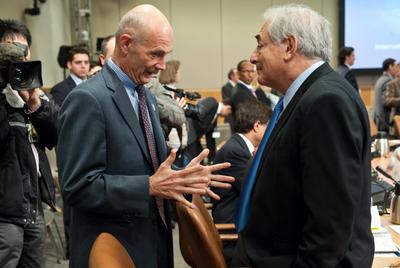The G20, as a premier forum for global economic cooperation, is now tasked with steering the world economy onto a path for strong, sustainable and balanced growth. While economic performance has generally improved from the depths of 2008, there is significant variation among the G20 countries in the pace of recovery. This implies that the individual G20 countries now face different policy priorities, unlike the beginning of the crisis when they shared the urgency of crisis. Under such circumstances, the success of the G20 as an effective intergovernmental forum for the post-crisis world will depend on its ability to deliver credible commitments by its member governments toward the goal of global, comprehensive growth.
Asia — now accounting for nearly 30 per cent of world GDP (PPP) and more than one-fourth of world trade — is an essential partner in the global economy. Reflecting the reality of a new multipolar world, with emerging market economies rising as new poles of global growth, the G20 has emerged as a new forum to galvanise modern multilateralism. With strong, robust economies, Asia is well-positioned to assume its G20 responsibilities and take the lead in addressing the four central global issues.
First is an orderly resolution of global imbalances. With economic recovery varied in speed and strength, global imbalances are again on the rise, threatening sustained recovery. Asia has the ability to accept a greater role in helping correct global macroeconomic and structural imbalances. It can do so by rebalancing its own sources of growth. From the Asian perspective, rebalancing translates into two strategic goals: increasing intra-regional trade and stimulating domestic demand. With demand falling from the slow-growing industrial countries, intra-regional trade in final goods is expected to increase. It is therefore important for the region to dismantle any barriers to intraregional trade. No less important is the stability of intra-regional exchange rates, with evidence pointing to its positive role in supporting intra-regional trade.
Second is strengthening the global financial architecture to safeguard financial stability. While emerging market economies face substantial risks from volatile international capital flows and associated swings in exchange rates, there has been limited systematic support against these risks at the global level. This has encouraged massive accumulation of foreign exchange reserves in emerging market economies, contributing to global imbalances. The G20 leaders have agreed to strengthen global financial safety nets, but the devil is in the details — including reform of the IMF and the collation between the IMF and other regional financing arrangements. The latter, especially, raises the stakes on policy issues (such as the relative contributions of regional and global facilities, conditionality, terms, and negotiating modalities) and institutional issues (such as channels of communication, representation, and even membership). Given its momentum, regionalism poses the most important long-term challenge to the IMF and its role in the international monetary and financial system. G20 regional members have responsibility to promote open regionalism and balance between stronger regionalism and burgeoning new multilateralism.
Third is the conclusion of the Doha Development Round of global trade negotiations. While the G20 leaders reiterated their commitment to concluding Doha on each and every declaration of the summit, there remains no timetable or any particular innovative approach or mechanism to achieve this. As most of the stalemate issues involve disputes among the core G20 members, not addressing and resolving the disputes could seriously undermine the credibility of the G20’s capacity for international economic cooperation.
Finally, despite the visible progress in economic achievement, income inequality and pervasive poverty remain a real threat to economic and socio-political stability in many emerging market economies. As home to 72 per cent of the world’s poor (with 1.8 billion living on less than US$2 per day) Asia has vested interest in realising the G20 development agenda, making it important to link any strategies and policy measures — including those directed toward lowering global imbalances and mitigating their impact — to the ultimate goal of welfare improvement.
A spirit of cooperation is key to finding solutions to pressing global issues, and a new global economic governance structure should reflect the changing economic weight of emerging economies. In such a framework, Asian members of the G20 — instilled with growing political confidence arising from their economic prosperity — can make a substantive contribution by helping to set the vision and ambitions for global rebalancing. They can share Asia’s unique experience in areas such as establishing international production networks, supported by strong private and public partnership. In global financial reform, Asia should no longer be content to leave it to powerful industrial nations to decide; it must join in setting new standards for global financial institutions and in regulating risk at all levels of governance. The success of the G20 will ultimately depend on emerging market economies’ sense of ownership in the G20 agenda of global reform.
Cyn-Young Park is Principal Economist of the Office of Regional Economic Integration at the Asian Development Bank.
This is a summary of a report of the same title published jointly by the Asian Development Bank and the Peterson Institute for International Economics under the Asian Development Bank’s Technical Assistance 7501, ‘Asia’s Strategic Participation in the Group of Twenty for Global Economic Governance.’

